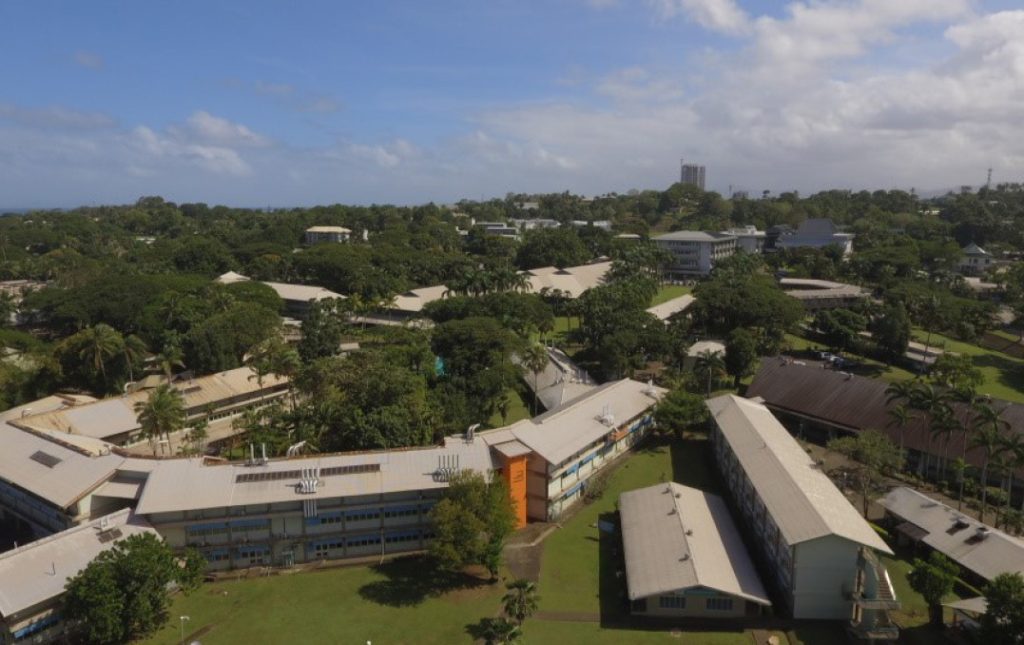Our Commonwealth – The University of the South Pacific

by Dr Rajni Kaushal Chand
Director, Pacific Centre for Flexible and Open Learning for Development (PACFOLD)
Director, Centre for Flexible Learning,
The University of the South Pacific (USP), Fiji
The University of the South Pacific (USP) — the only regional tertiary institution in the Southern Hemisphere — was established in 1968 at Laucala Bay in Fiji, which was a former New Zealand Air Base. It began providing distance education for all of its 12 member countries in the early 1970s. Later, other campuses were established in Vanuatu, and Samoa followed by smaller campuses and sub-campuses set up in all of the 12 member countries that is now regional students’ learning hub for their Open, Distance and Flexible (ODFL), face-to-face (F2F), online and blended studies. Soon after Distance Learning was established, and later when online courses were offered through Moodle, the Learning Management System (LMS) in 2006, the ODFL policies were designed to ensure that the quality of learning and teaching at USP met the international standards.
The Centre of Flexible Learning (CFL) at USP plays an important role in ensuring that the flexibility of learning and teaching is not compromised by ensuring the USP’s Flexible Learning Policy and Open Educational Resources (OER) policies are met for all the courses at USP. Courses designed at CFL cover the whole spectrum — traditional print mode courses, use of satellite tutorials, F2F with regional campus-based tutorial support, complete online courses, blended and flexi school mode with academics travelling to remote regional campuses to offer F2F experiences to learners at USP.
The Southern Hemisphere is prone to natural disasters such as cyclones and hurricanes and every time a disaster affects the university study, USP has been able to switch the mode of study to provide flexibility as needed by regional countries.
The Pacific Centre for Flexible and Open Learning for Development (PACFOLD) is the Commonwealth of Learning’s regional centre which is hosted by the CFL based at USP.
During the Covid–19 lockdown, PACFOLD, approached COL to assist USP in hosting a LMS platform to provide an online orientation and skill development program for its potential new learners. The lockdowns’ impact on learning, with a possibility of no F2F orientation program needed urgent planning to provide USP’s potential learners some awareness, confidence and much more.
Many universities’ orientation and study programmes have been impacted by the current Covid–19 outbreak. While some struggled with the difficulty of fewer students enrolling due to travel constraints, others were still debating whether to open their doors for F2F education. USP experienced a distinct difficulty.
Orientation sessions are often held on all campuses, however the majority of new students arrived early at USP’s main campus in Fiji for the session. Students’ travels were limited because of Covid–19, and this year (2022), the orientation programme was held in a relatively confined space. Additionally, USP began Semester One later due to issues with Year 13 external exams for one of its member countries (Fiji). This implied that rather than starting the semester in mid-February as usual, the university now commenced in late March, which affected more than 3,000 provisional students.
USP launched an online orientation programme called “Semester Zero” in order to keep these prospective students interested for nearly two months. The program’s goal was to introduce these prospective new students to USP utilising a Moodle platform rather than a conventional face-to-face orientation session while still combining the fundamental literacy, numeracy and digital skills required for new students.
While we cannot prevent disasters from occurring, we can choose and adjust how exposed our universities are to them. In the South Pacific region, the Semester Zero programme was the first of its kind. It is crucial to highlight that a programme, such as this, is necessary for universities to remain open and prepared for any forms of disaster.

